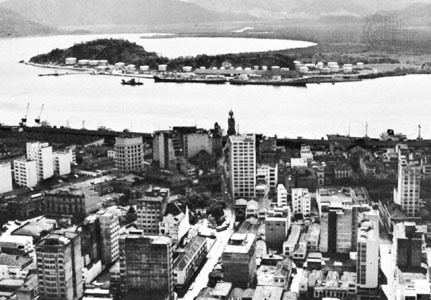Santos
Brazil
 port city, southeastern São Paulo estado (state), southeastern Brazil. It occupies an alluvial plain on the inner side of São Vicente Island, cut off from the mainland by a tidal channel. The city lies only a few feet above sea level, and its swampy island is drained by deep concrete conduits. The channel is free from obstructions, and in front of the city it widens into a bay deep enough for the largest oceangoing vessels. The docks are 4 miles (6 km) long and can accommodate about 50 ships at a time.
port city, southeastern São Paulo estado (state), southeastern Brazil. It occupies an alluvial plain on the inner side of São Vicente Island, cut off from the mainland by a tidal channel. The city lies only a few feet above sea level, and its swampy island is drained by deep concrete conduits. The channel is free from obstructions, and in front of the city it widens into a bay deep enough for the largest oceangoing vessels. The docks are 4 miles (6 km) long and can accommodate about 50 ships at a time.Founded in 1543 and named for the Hospital dos Santos in Lisbon, it was sacked by the English privateer Thomas Cavendish in 1591. It has become one of the world's leading coffee ports, and the aroma of coffee permeates the city. In addition to coffee, principal exports include sugar, bananas, xarque (jerked beef), corn (maize), seafood (sardines, croakers, hake, lobster), oranges, and hides. Automobiles, auto parts, transport equipment, electrical machinery, steel and ferroalloy products, shoes, clothing, and textiles are other major exports. Local industries include sawmills, canneries, and factories producing cement, candy, soap, soft drinks, and canvas items. A petroleum refinery at nearby Cubatão and a hydroelectric plant serve the city. Santos is the country's largest port and was significantly modernized in the 1990s. The city is home to the internationally known Santos football (soccer) club and its sizable stadium; the team is perhaps best known for Pelé, a former player who is one of the most famous athletes in the world.
A humid, subtropical climate and marshy surroundings once created unfavourable living conditions, but drainage canals, the paving of streets, better housing, sanitation, and port improvements have given Santos a healthful environment. A suburban seaside resort, Guarujá, attracts many visitors from inland Brazil. Railroads and highways descend the steep coastal range, the Serra do Mar, from the city of São Paulo, 50 miles (80 km) northwest. Pop. (2005 est.) 416,100.
- Stubbs, William
- stuccowork
- studbook
- Studebaker, Clement
- student aid
- Student Nonviolent Coordinating Committee
- Students for a Democratic Society
- Student's t-test
- Studs Terkel
- Study of Democratic Institutions, Center for the
- study of religion
- Stuka
- Stukeley, William
- Stumpf, Carl
- Stumpf, Johannes
- stunt
- stunt flying
- stupa
- Stupino
- Sturbridge
- Sturdza, Dimitrie Alexandru
- Sture, Sten, The Elder
- Sture, Sten, The Younger
- Sture, Svante
- Sturge, Joseph